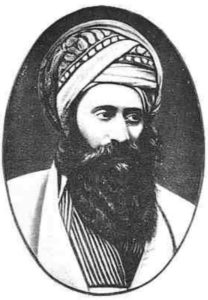Baghdad’s Greatest Sage

Rabbi Yosef Chaim of Baghdad, the Ben Ish Chai
Yosef Chaim ben Eliyahu (1832-1909) was born in Baghdad, the son of the city’s chief rabbi. After being miraculously saved at the age of 7, he resolved to devote his life to God and His Torah. He went to study at Baghdad’s Beit Zilka school, and spent all of his extra time absorbing his father’s extensive library of religious texts. When he was 14, a letter arrived from the chief rabbi of Turkey with a question for his father regarding a difficult case. His father was away at the time, so young Yosef Chaim answered the question himself. The chief rabbi sent a letter back: “Your son, dear to your soul, has already preceded you and decided this case. May his father rejoice in him…” Not surprisingly, when his father passed away, Yosef Chaim was immediately chosen as his replacement, and officially given the title of Hakham (the traditional Sephardic term for a rabbi). He was beloved by the entire Baghdad community, who regularly crowded into synagogues to hear his penetrating sermons, and who listened to his every word and instruction. One set of those sermons – which combined Halacha (Jewish law), with Kabbalah (Jewish mysticism), organized by the weekly Torah portion – was compiled into a book called Ben Ish Chai. The book was so popular that Hakham Yosef Chaim himself became known as the “Ben Ish Chai”. (The title has further significance because the Hakham believed himself to be a reincarnation of the great Biblical figure Benayah, who was called Ben Ish Chayil.) The Ben Ish Chai was known for his incredible humility and piety. He slept very little, built a mikveh inside his house so that he can purify himself daily, and at one point spent six continuous years fasting (eating only a little bit at night). He inspired Sephardic and Ashkenazi Jews alike, as well as the local Arabs. It is said that during his tenure there was no Jew in Baghdad that did not keep kosher or Shabbat. Throughout this time he never took a penny for his work, and made a living through his publications and his own wise investments. Many of his students became great rabbis in their own right, and Ben Ish Chai is still among the most popular Jewish books today, especially in the Sephardi world. Hakham Yosef Chaim also wrote a number of other works, including a book of kosher stories so that Jews wouldn’t be too drawn to secular novels. He is regarded as one of the greatest Kabbalists of all time. The Porat Yosef Yeshiva in Jerusalem’s Old City – today one of the most famous and prestigious in the world – was founded upon his instructions and guidance. Tonight, the 13th of Elul, marks 110 years since his passing.
10 Ladino (“Sephardic Yiddish”) Words to Use All the Time
Why Break a Glass at a Jewish Wedding?
Words of the Week
Just as punishment is brought upon a person because of evil speech, so is he punished if he could have spoken good words but did not.
– Zohar III, 46b

The Porat Yosef Yeshiva near the Western Wall in Jerusalem. The Yeshiva was founded by Jewish-Indian philanthropist Yosef Shalom at the request of the Ben Ish Chai. The original building was destroyed by the Arabs in 1948. It was rebuilt in 1967 following Jerusalem’s reunification during the Six-Day War.


